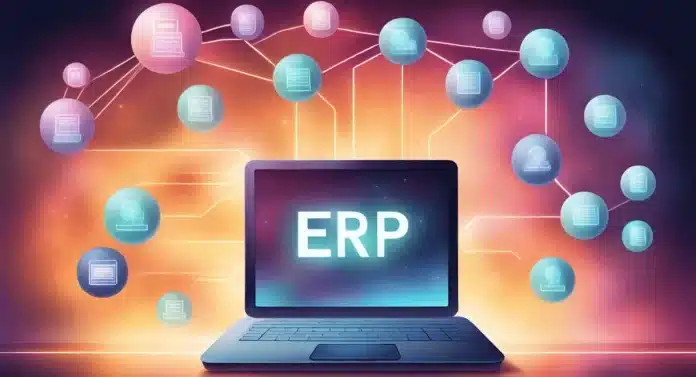By integrating RPA into ERP systems, Philippine enterprises can enhance their efficiency, agility, and innovation. RPA automates repetitive, rule-based tasks, allowing employees to focus on strategic decision-making and value-added activities. With improved data accuracy and streamlined processes, businesses can make informed choices and adapt quickly to market changes.
In this article, we will delve into the benefits of RPA in ERP systems, the challenges of implementation, and explore future trends that can further optimize Philippine enterprises. Ready to unlock the full potential of your ERP system with RPA? Let’s dive in!
Table of Contents
Understanding RPA and ERP Integration
Robotic process automation (RPA) is a transformative technology that enables businesses to automate repetitive, rule-based tasks using software robots or “bots.” When integrated with enterprise resource planning (ERP) systems, RPA brings a multitude of benefits that drive operational efficiency and business growth.
By harnessing the power of RPA, businesses can significantly improve data accuracy, reducing the risk of human error associated with manual data entry. This enhanced accuracy allows organizations to make informed decisions based on reliable information, leading to improved operational outcomes. Furthermore, RPA streamlines processes, eliminating time-consuming and error-prone manual tasks. This streamlined workflow optimizes resource utilization and improves overall productivity.
One of the key advantages of integrating RPA and ERP systems is the real-time data processing capability. RPA bots can swiftly collect and analyze data from various sources, providing valuable insights and empowering decision-makers to make data-driven choices promptly. Additionally, with RPA’s ability to handle vast amounts of data, ERP systems can benefit from improved analytics and reporting capabilities.
Not only does RPA integration optimize business processes, but it also enables cost savings. By automating repetitive tasks, organizations can reduce the need for extensive human intervention, resulting in reduced labor costs and improved operational efficiency. The saved time and resources can be redirected towards more strategic and value-added activities, fostering innovation and driving business growth.
The seamless integration of RPA and ERP systems lays the groundwork for unlocking greater business potential. By automating routine tasks, enhancing data accuracy, and enabling real-time data processing, RPA empowers organizations to optimize their ERP systems and achieve higher levels of efficiency and productivity.
Stay tuned for the next section, where we explore the specific benefits of RPA integration in ERP systems and how it can revolutionize the way Philippine enterprises operate.
Benefits of RPA in ERP Systems
The integration of robotic process automation (RPA) into enterprise resource planning (ERP) systems offers several benefits. One of the main advantages is enhanced efficiency. RPA automates manual, repetitive tasks, reducing the time and effort required for completion. This leads to increased productivity and allows you to focus on more strategic and value-added activities.
RPA also streamlines processes, eliminating bottlenecks and reducing errors. By automating routine tasks, RPA improves data accuracy and consistency, leading to better decision-making and improved overall performance. With streamlined processes, you can achieve optimal resource utilization and achieve your business goals more efficiently.
Additionally, the integration of RPA in ERP systems enables faster transaction processing, enhancing customer satisfaction and business agility. With automated workflows and reduced processing time, you can provide quicker responses to customers’ needs, resulting in improved customer experiences and increased customer loyalty.
Overall, the incorporation of RPA into ERP systems empowers your organization to achieve enhanced efficiency, streamlined processes, and improved performance. By leveraging this powerful combination, you can optimize your business operations and drive sustainable growth in the ever-evolving landscape of the Philippines.

Implementing RPA in ERP Systems
Implementing robotic process automation (RPA) in enterprise resource planning (ERP) systems can present certain challenges. One of the main challenges is the integration of RPA with existing ERP systems and processes. It requires careful planning, collaboration between IT and business teams, and thorough testing to ensure seamless integration and optimal performance.
Additional challenges include change management, as employees may resist or be apprehensive about the adoption of automation technologies. Training and communication are crucial in addressing these challenges and gaining employee buy-in. It’s also important to choose the right RPA tools and technologies that align with your organization’s specific needs and priorities.

Integration Challenges:
Implementing RPA in ERP systems can be complex due to the need for integration with existing systems. Collaboration between IT and business teams is crucial for successful integration. Additionally, careful planning and thorough testing are required to ensure seamless integration and optimal performance.
Change Management:
Implementing RPA may face resistance from employees who are apprehensive about adopting automation technologies. Training and effective communication are vital in addressing these challenges and gaining employee buy-in. Clearly articulating the benefits of RPA integration can help ease the transition.
Choosing the Right Tools:
When implementing RPA in ERP systems, it’s essential to choose the right tools and technologies that align with your organization’s specific needs and priorities. Conduct thorough research and select solutions that offer compatibility, flexibility, and scalability to ensure a successful integration.
Challenges of RPA in ERP Integration
Integrating robotic process automation (RPA) with enterprise resource planning (ERP) systems can present several challenges that organizations need to overcome for successful implementation. One of the main challenges is ensuring data compatibility and synchronization between RPA bots and ERP systems. This becomes especially complex when dealing with legacy systems or custom configurations, requiring thorough understanding and meticulous planning.
Scalability is another challenge in RPA-ERP integration. As organizations handle large volumes of data and complex processes, it’s essential to have RPA solutions that can scale effectively. Ensuring seamless integration and optimal performance is crucial to avoid disruptions and inefficiencies.
Security and data privacy are also significant considerations. When integrating RPA with ERP systems, protecting sensitive information becomes paramount. Organizations must implement robust security measures and adhere to data privacy regulations to mitigate risks and safeguard confidential data.
Overcoming these challenges requires a comprehensive understanding of both RPA and ERP technologies, effective communication between IT and business teams, and a well-defined implementation strategy. With careful planning and collaboration, organizations can successfully integrate RPA with ERP systems, maximizing the benefits of automation while mitigating potential risks.
Future Trends of RPA in ERP
The future of robotic process automation (RPA) in enterprise resource planning (ERP) systems holds tremendous potential. As RPA technology continues to evolve, we can expect exciting advancements that will shape the future of ERP automation.
One significant area of advancement is cognitive automation. RPA bots will become smarter and more capable of performing complex tasks, thanks to advancements in machine learning and artificial intelligence (AI). These technologies will enable RPA bots to make intelligent decisions, adapt to changing business requirements, and handle more sophisticated processes.
Moreover, the integration of RPA with emerging technologies like blockchain and the Internet of Things (IoT) will further enhance the capabilities of RPA in ERP systems. RPA can leverage blockchain to enhance data security and integrity, while IoT integration offers new avenues for data collection and analysis, enabling a more comprehensive automation experience.
The ongoing development and adoption of RPA will drive increased automation, improved efficiency, and greater agility in ERP processes. Organizations that embrace these future trends will gain a competitive edge in the ever-evolving business landscape.

Understanding ERP System Optimization Post-Pandemic
In the wake of the pandemic, optimizing your enterprise resource planning (ERP) systems is vital to ensure the stability and growth of your business. It’s essential for organizations to reassess their current business models, identify areas for improvement, and leverage technology solutions that can drive their success in the post-pandemic landscape.
One such solution that holds immense potential is cloud-based ERP systems. By adopting cloud ERP, businesses gain access to flexibility, scalability, and cost-effectiveness, allowing them to adapt seamlessly to changing market conditions and meet evolving customer demands.
Cloud ERP enables remote access, fostering collaboration among teams regardless of their physical location. This enhances productivity and streamlines communication, ensuring that no crucial decisions or actions are delayed. Additionally, real-time data analysis empowers decision-makers with valuable insights that drive informed choices and strategic planning.
Optimizing your ERP systems is a pivotal step towards digital transformation. By embracing cloud-based solutions and harnessing the power of real-time data, you position your business for success in the post-pandemic era. It allows you to adapt swiftly, remain agile, and drive growth in a rapidly evolving market.
Embracing Cloud ERP for a Successful Future
Cloud-based ERP systems offer numerous advantages that are particularly valuable in a post-pandemic world. With the ability to optimize resources, leverage real-time data analysis, and facilitate remote collaboration, cloud ERP empowers your business to thrive in any situation.
By implementing cloud ERP, you unlock the potential for accelerated growth, improved operational efficiency, and enhanced customer experiences. The scalability and cost-effectiveness of the cloud ensure that your ERP systems can adapt to your business needs without straining your budget or resources.
As the business landscape continues to evolve, embracing cloud-based ERP and optimizing your systems will be critical in staying ahead of the competition and positioning your business for long-term success.
Elevating the Efficiency of Philippine Enterprises with RPA-Integrated ERP Systems
In today’s rapidly evolving business landscape, the integration of robotic process automation (RPA) with Enterprise Resource Planning systems holds immense potential for Philippine enterprises. By harnessing RPA technologies, businesses can automate repetitive tasks, streamline processes, and enhance data accuracy. The result? Improved operational efficiency, increased productivity, and cost savings.
With RPA-integrated ERP systems, businesses can benefit from real-time data processing and analytics, empowering decision-makers with valuable insights. This enables informed decision-making, facilitating agility and innovation. As the Philippines embraces digital transformation in the post-pandemic era, optimizing ERP systems with RPA will be vital.
By driving digital transformation and adopting HashMicro RPA-integrated ERP systems, Philippine enterprises can foster innovation, drive growth, and stay competitive. These advanced systems enable businesses to adapt to changing market conditions and customer demands, positioning them for success. Try the free demo now!




































